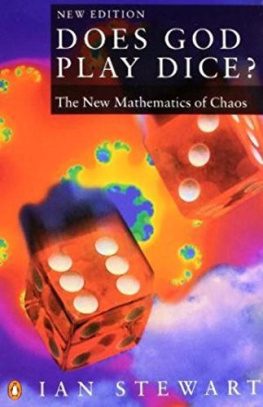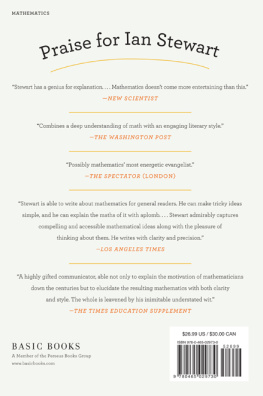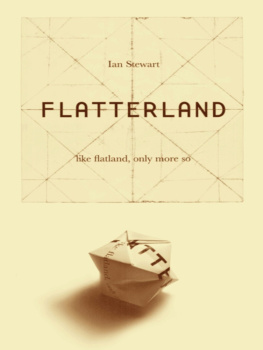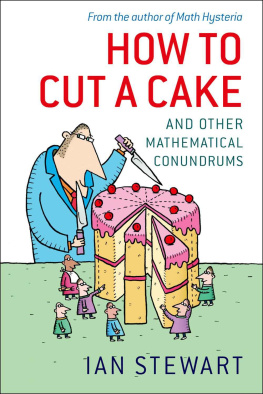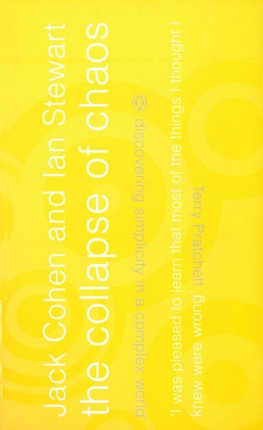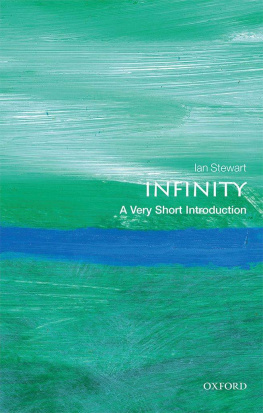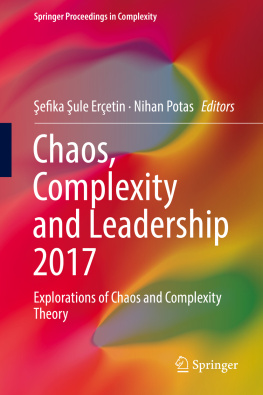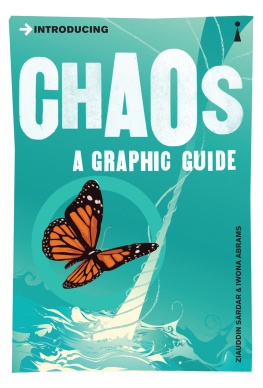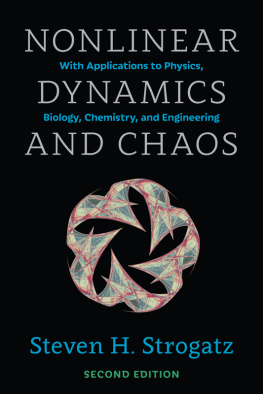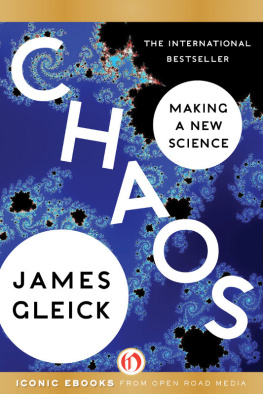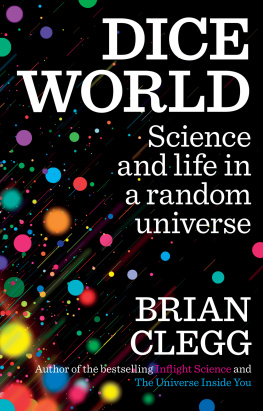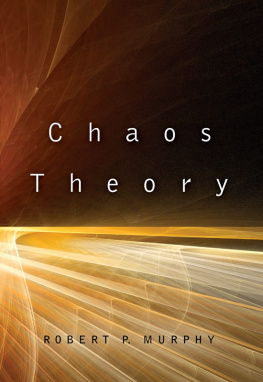PENGUIN BOOKS
DOES GOD PLAY DICE?
Ian Stewart was born in Folkestone in 1945. He graduated in mathematics from Cambridge and obtained a Ph.D. from the University of Warwick, where he is now Professor of Mathematics. He has also held visiting positions in Germany, New Zealand, Connecticut and Texas. He is an active research mathematician with over a hundred published papers, and he takes a particular interest in problems that lie in the gaps between pure and applied mathematics.
Ian Stewart has written or co-authored over sixty books, including Nature's Numbers, shortlisted for the 1996 Rhone-Poulenc Prize for Science Books; The Collapse of Chaos; Fearful Symmetry; From Here to Infinity; Game, Set and Math; Another Fine Math You've Got Me Into; The Problems of Mathematics; the bestselling Does God Play Dice?; Nature's Numbers; From Here to Infinity; Figments of Reality; and Life's Other Secret (several of which are published in Penguin); and three mathematical comic books published in French. He has written for a wide range of newspapers and magazines in the UK, Europe and the USA, including Nature, Focus, Discover and The Sciences. He is mathematics consultant for New Scientist and writes the Mathematical Recreations columns in Scientific American. He also writes science fiction stories and has made numerous radio and television appearances. In 1995 the Royal Society awarded him the Michael Faraday Medal for the year's most significant contribution to the public understanding of science, and he has been selected for the 1997 Communicator Award of the Joint Policy Board for Mathematics in the USA.
Does God Play Dice?
THE NEW MATHEMATICS OF CHAOS
Second edition
Ian Stewart
PENGUIN BOOKS
PENGUIN BOOKS
Published by the Penguin Group
Penguin Books Ltd, 80 Strand, London WC2R 0RL, England
Penguin Putnam Inc., 375 Hudson Street, New York, New York 10014, USA
Penguin Books Australia Ltd, 250 Camberwell Road, Camberwell, Victoria 3124, Australia
Penguin Books Canada Ltd, 10 Alcorn Avenue, Toronto, Ontario, Canada M4V 3B2
Penguin Books India (P) Ltd, 11 Community Centre, Panchsheel Park, New Delhi 110 017, India
Penguin Books (NZ) Ltd, Cnr Rosedale and Airborne Roads, Albany, Auckland, New Zealand
Penguin Books (South Africa) (Pty) Ltd, 24 Sturdee Avenue, Rosebank 2196, South Africa
Penguin Books Ltd, Registered Offices: 80 Strand, London WC2R 0RL, England
www.penguin.com
First published by Basil Blackwell 1989
Published in Penguin Books 1990
Second edition published 1997
Copyright Ian Stewart, 1989, 1997
All rights reserved
The moral right of the author has been asserted
Except in the United States of America, this book is sold subject to the condition that it shall not, by way of trade or otherwise, be lent, re-sold, hired out, or otherwise circulated without the publisher's prior consent in any form of binding or cover other than that in which it is published and without a similar condition including this condition being imposed on the subsequent purchaser
ISBN: 978-0-14-192807-4
Contents
Preface to the Second Edition
The first edition of Does God Play Dice?, published in 1989, didn't have a preface. I was going through a period when I didn't write prefaces because I thought that nobody ever reads them, so it started with a prologue instead. The prologue remains, but now there's a preface to go with it after all, two prologues would be overkill. If you already own the first edition and are wondering whether this one is different enough to be worth buying, you should either read this bit or thumb through where most of the new stuff lives. If not, just buy it now, OK? You can decide whether to read the preface when you get the book home.
Chaos is not just a trendy word for random. In the sense now prevalent in science, it is an entirely new and different concept. Chaos occurs when a deterministic (that is, non-random) system behaves in an apparently random manner. It may sound paradoxical, but apparently hides many sins. The big discovery of the last decade is that chaos is just as common as traditional types of regular behaviour, such as steady states and periodic cycles. In retrospect, there's nothing very surprising about chaos. From today's viewpoint, and with the benefit of 20/20 hindsight, it's very easy to understand how chaos arises and why it often occurs. Despite this lots of people, many of them scientists, still talk about chaos as if it is something weird and exotic. Sorry, but it isn't. Chaos is just as down-to-earth as periodic cycles. But over several centuries we've got used to periodic cycles, whereas we've only just stumbled upon the existence of chaos and we haven't got used to it yet. That's not a surprise either: chaos is much more subtle and intricate.
Chaos has come a long way since 1989. It has transmuted, especially in the popular press, into something called chaos theory. I think it's a mistake to view chaos as a theory in its own right, but I appreciate that journalists need a catchy phrase to sum up the area, and what else would you call it? So I sometimes use that phrase myself, though on the whole I use it to refer to the popular image of chaos, as distinct from that of practising scientists. However, chaos isn't a theory. It's a concept, and one that cannot sensibly be separated from the rest of dynamics. It's an idea that cuts across all of the traditional subject boundaries of science. It's a missing piece from a vast jigsaw puzzle. It's a far-reaching unification of order and disorder. But whatever it is, chaos no more deserves to be isolated as a theory in its own right than skeleton theory deserves to be isolated from zoology.
There is a new theory, which goes by such names as nonlinear systems theory, dynamical systems theory, or nonlinear dynamics: new not in the sense that nothing like it ever existed before, but in the sense that it has really taken off and deserves to be considered as a theory in its own right. Often this is what people really mean when they say chaos theory. In fact there are at least two meanings to the word theory There is the sense used in the phrase quantum theory or relativity theory a statement about how nature behaves. The utility of such a theory depends upon it matching nature sufficiently well. Nonlinear systems theory is a theory in the other sense, a coherent body of mathematical knowledge with a clear and consistent identity. As such, there is no serious question about its correctness: when mathematics is wrong the mistakes are usually glaring. The big question is: does the concept of chaos afford new scientific insights? (If not, then we'll have to scrub nonlinear dynamics: you can't divorce one from the other.) Can chaos theory in the mathematical sense become the basis for new theories in the scientific sense?
This is where chaos can become controversial, because it is no longer just a matter of checking the mathematics and making sure there aren't any errors. Analogously, calculus is a valid mathematical theory, but that doesn't imply that every application of calculus to science must be right. If you set up the wrong differential equations when you model the motion of the Moon, then no matter how correctly you apply calculus, you'll get nonsense. The same is true if your theoretical model generates chaos: the link from the model to chaos may be impeccable, but what about the link from reality to the model?
Does God Play Dice? has two distinct themes. One is to explain the mathematical concept of chaos, and why it is both natural and inevitable. The other is to ask: does chaos occur in the real world? In order for that question to make sense, it has to be reformulated. No mathematics
Next page
